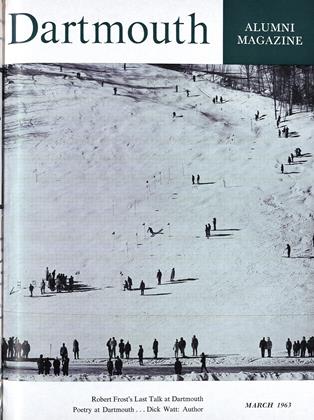The American Historical Association has elected Prof. Louis Morton of the History Department as its representatives on the Board of Directors of the social Sciences negative images was shown for the first time in this country at the Hopkins Center in February.
PROF. John Kemeny of the Mathematics Department told a national meeting of high school principals in Pittsburgh that boredom, poor instruction, and an outdated curriculum are costing this country many badly needed mathematicians. The address was one of a series of appearances he has been making across the country.
THOMAS K. LANDAUER, Assistant Professor of Psychology, has received a grant from the National Institutes of Health to study man's ability to remember and recall a previously known fact. He explains that there are three stages in the human information storage process: learning, retention, and recall. His studies of the recall process have led him to measure the amount of time a subject has known the specified fact, how frequently he has used his knowledge of it, how long it has been since he last used the knowledge, the nature of the sensory event, and the action required by the subject to recall the fact.
ANEW research program in the Medical School's Cytology Department encompasses four major problems in muscle studies, and one of them involves a clam's well-kept secret - how he can stay "clammed up." A special muscle that maintains great tension with little expenditure of energy allows the clam to do it, but how does he do it? Dr. Andrew G. Szent-Gyorgyi, who joined the Medical School faculty last fall, heads a group studying these phenomena. The program is supported by grants from the National Science Foundation and the National Institutes of Health totaling $401,860 and extend over a five-year period. The Dartmouth research team is now pursuing studies which indicate that the clam's energy-conserving muscular endurance may result from a simple interplay between two separate but related biochemical systems. Their theory holds that paramyosin, a fibrous protein found in the clam's catch muscle, freezes muscle tension.
Co-investigator in the program is Dr. William R. Middlebrook, who like Dr. Szent-Gyorgyi came to Dartmouth from the Institute for Muscle Research, Marine Biological Laboratory, Woods Hole, Mass. Others at Dartmouth involved in the various aspects of the studies include Dr. Shinya Inoue, chairman of the Cytology Department; Eva M. Szentkiralyi-Szent-Gyorgyi, research associate; Dr. Forrest R. Goodall, U. S. Public Health Service postdoctoral fellow in cytology; and Gwen Prior, senior research assistant.
PROF. Richard Eberhart '26 served as one of the five judges charged with awarding the Bollingen Prize in Poetry, given annually by the Yale University Library. Robert Frost '96 was named the winner for 1963. The judges informed Mr. Frost of his selection shortly before his death. "He was delighted," Professor Eberhart said.
PROF. F. Herbert Bormann recently conducted a seminar for University of Connecticut faculty members on "The Ecology and Physiology of Root Grafting." Another member of the Biological Sciences Department, George B. Saul 11, attended a conference of geneticists at Oak Ridge, Tenn., which considered recent developments in this field.
DARTMOUTH'S celebrated "Battle Night" talks, lectures by Professor Emeritus Lewis D. Stillwell which have informed and entertained several student generations, will be broadcast over a three-station educational radio network beginning this month. Eighteen half-hour lectures dealing with the principal battles of World War II will be aired at 8 p.m. Sunday night for 18 weeks commencing March 3. Alumni within range of Boston's WGBH-FM (89.7 mc), Amherst's WFCR-FM (88.5 mc), or Albany's WMAC-FM (90.3 mc) can hear them.
 View Full Issue
View Full Issue
More From This Issue
-
 Feature
FeaturePOETRY AT DARTMOUTH
March 1963 By RICHARD EBERHART '26 -
 Feature
FeatureRobert Frost on "Extravagance"
March 1963 -
 Feature
FeatureTHE SECRET LIFE OF RICHARD WATT
March 1963 By DON MURRAY -
 Class Notes
Class Notes1921
March 1963 By JOHN HURD, HUGH M. MCKAY -
 Article
ArticleScholarly Stimulator of Comparative Study
March 1963 By G.O'C. -
 Class Notes
Class Notes1920
March 1963 By CHARLES F. MCGOUGHRAN, ALBERT W. FREY
GEORGE O'CONNELL
-
 Feature
FeatureTHE DARTMOUTH CONVOCATION ON GREAT ISSUES IN THE . ANGLO – CANADIAN – AMERICAN COMMUNITY
October 1951 By GEORGE O'CONNELL -
 Article
ArticleTHE FACULTY
March 1962 By GEORGE O'CONNELL -
 Article
ArticleTHE FACULTY
June 1962 By GEORGE O'CONNELL -
 Article
ArticleTHE FACULTY
OCTOBER 1964 By GEORGE O'CONNELL -
 Article
ArticleThe Faculty
NOVEMBER 1965 By GEORGE O'CONNELL -
 Article
ArticleThe Faculty
FEBRUARY 1966 By GEORGE O'CONNELL







